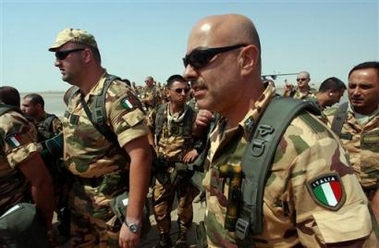Italy will pull 1,100 of its troops from Iraq in June, the new government
said Friday, giving its first specific numbers about the planned withdrawal.

Italian troops arrive
at the U.S. Tallil air base, about 6 miles from the city of Nasiriya in
southern Iraq, Thursday, June 26, 2003.
[AP] |
"In June we will reduce our troops from 2,700 to 1,600," Foreign Minister
Massimo D'Alema said during an evening television show.
His announcement came hours after he met with Premier Romano Prodi to map
Italy's exit strategy from the U.S.-led coalition.
Most Italian troops in Iraq are in the southern Iraqi city of Nasiriyah. They
are involved in training, security and reconstruction.
The decision to withdraw this many troops by June belongs to the previous
government of conservative Silvio Berlusconi. The new center-left government of
Romano Prodi was merely staying with it for the time being, Foreign Ministry
spokesman Pasquale Terracciano said.
"The next steps have not been decided yet," Terracciano said.
Prodi had opposed the U.S.-led war in Iraq and pledged during his campaign
for the elections in April which brought him and his center-left allies to power
to bring Italian troops home and replace the contingent with a civilian force.
He has said the timing of the pullout would be worked out with allies and the
Iraqis.
In contrast, Berlusconi defied widespread opposition at home and sent about
3,000 soldiers to Iraq to help with reconstruction after the ouster of Saddam
Hussein in 2003. But he began withdrawing troops before Italy's election last
month and said all Italian troops would be brought home from Iraq by year's end.
It was unclear how Prodi's withdrawal plans might differ from that of
Berlusconi's government.
In the months after the March 2003 invasion, the multinational force peaked
at about 300,000 soldiers from 38 nations, 250,000 from the United States, about
40,000 from Britain, and the rest ranging from 2,000 Australians to 70
Albanians.
But U.S. allies in Iraq have slowly but steadily drawn down or pulled out as
Iraqi forces take more responsibility for securing the country. By year's end,
officials say, the coalition may shrink noticeably.
Bush has declined to discuss news reports that the Pentagon hoped the U.S.
force, now at 131,000 troops, could be reduced to about 100,000 by year's end.
Britain, with about 8,000 troops in Iraq, is the United States' most
important coalition ally. Officials repeatedly have said they hope to begin
bringing home some of their troops this year.
Australia maintains about 1,300 troops in Iraq and the Middle East.
Poland's new president, Lech Kaczynski, told the AP his country might keep
its scaled-down contingent of 900 troops in Iraq into 2007.
Among the larger contributors to pull out was Ukraine, which withdrew its
last contingent of 876 troops in December. Bulgaria also brought home its 380
infantry troops.
South Korea says it plans to bring home about 1,000 of their 3,270 troops in
phases this year.
Tokyo has some 600 troops based in the southern Iraqi city of Samawah for
non-combat humanitarian work, and speculation is high that the soldiers will be
withdrawn this year.